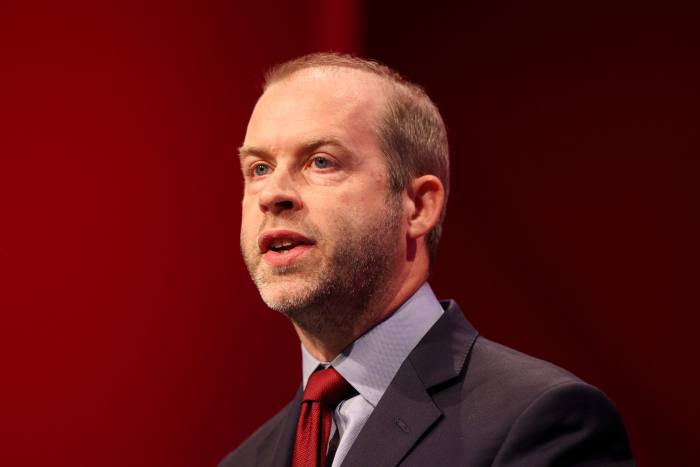Starmer pledges faster transition from fossil-fuel electricity
The UK would have an entirely carbon-free electricity system five years earlier under a Labour government, party leader Keir Starmer announced on Sunday.
Starmer also pledged that he would “put a stop” to new long-term exploration for oil and gas in the North Sea, in contrast to the current Conservative administration.
The Labour leader said that, if elected prime minister, he would set a target of a fossil-fuel free electricity system by 2030 to make the UK a net exporter of clean energy. That would require a faster rollout of renewable energy schemes, such as wind farms and solar panels, as well as new nuclear power stations.
That target compares with the Conservative government’s aim of reaching the same target by 2035, and generating 95 of electricity from carbon-free sources by 2030.
“The British people are sick and tired of rocketing energy bills and our energy system being exposed to dictators,” Starmer said. “They want long-term solutions to cut bills for good. That is why I am proud to announce that a central mission of my Labour government will be to turn the UK into a clean energy superpower.”
Jonathan Reynolds, Starmer’s shadow business secretary, claimed that hitting the clean energy target would save British households £93bn over the rest of the decade — given the sky-high wholesale price of gas.
Decarbonising the electricity system, however, is only one part of reaching the government’s existing “Net Zero 2050” target, which also requires shifting transport and heating systems from gas to electricity.
Labour said it would hit the 2030 electricity target by quadrupling offshore wind, accelerate the use of floating offshore wind farms, tripling solar power and doubling onshore wind capacity.
On Friday, the Conservatives quietly gave the go-ahead to new onshore wind turbines in England, after a lengthy moratorium imposed by former prime minister David Cameron.
The Labour plan also envisages the completion of new nuclear power stations at Hinkley Point and Sizewell, as well as backing new “small modular reactors”.
However, Starmer said a Labour government would keep a “strategic reserve” of back-up gas-fired power stations to guarantee security of supply. He added that it would invest in hydrogen and in carbon capture and storage schemes, to ensure there is zero-emission back-up power when there is no wind or sun.
The Labour leader said he would end the awarding of new oil and gas licences and oppose fracking, arguing that Britain’s reliance on fossil fuels has left the country “vulnerable to Putin’s manipulation of international markets.”
But an aide clarified that production from existing North Sea oilfields should continue to play an important role. “New long-term exploration isn’t the right option for price and climate reasons,” the person explained.
Labour’s plans for a new industrial strategy are due to be outlined by Reynolds at the party’s conference on Monday.
He will criticise the Conservative government for chopping and changing its approach to industrial policy over the past decade.
Under the Tory-Liberal Democrat coalition, Cameron authorised a new industrial strategy, only to drop it after the 2015 election. Then, his successor, Theresa May, approved a fresh industrial strategy which was junked by the next prime minister, Boris Johnson.
Not only would Labour adopt its own new industrial policy but it would also create an industrial strategy council which would be put on a statutory footing, Reynolds told the Financial Times. “This would help end the farce of long-term plans that do not survive the political cycle,” he said.
Reynolds promised a Labour government under Starmer would not return to the 1970s approach of trying to pick industrial winners by backing individual companies or sectors.
Instead, he said the Labour strategy would be compelled by the new council to achieve four missions: delivering clean power; harnessing data for the public good; “caring for the future”; and building an economy more resilient to supply-side shocks.
Under this Labour industrial strategy, there would be a “clear case for state intervention” to accelerate new clean-energy technologies with uncertain long-term pay-offs. Last year, the party set out plans to borrow £28bn a year for capital investment towards a transition to a green economy.
Reynolds said a Labour government’s second mission would be to harness data to transform the economy — citing the example of how artificial intelligence is already being used to prevent fraud and to develop vaccines and medicines.
The third element of the strategy would be the creation of a National Care Service to tackle the funding crisis in Britain’s social service. “If our care sector is struggling, other parts of our economy will begin to stutter and break down,” Reynolds argued.
The final part of the strategy is strengthening the resilience of supply chains in key sectors to guard against geopolitical shocks — most notably, the recent spike in energy prices.
For all the latest Business News Click Here
For the latest news and updates, follow us on Google News.

